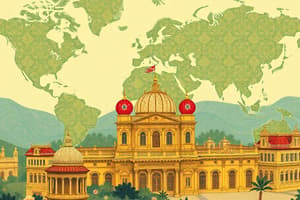Podcast
Questions and Answers
What distinguishes international business from domestic business?
What distinguishes international business from domestic business?
- Engagement in highly uncertain environments (correct)
- Less uncertainty and ambiguity
- Stable rules and regulations
- Involvement in familiar markets only
What should be a firm's primary focus according to its guiding principles in international business?
What should be a firm's primary focus according to its guiding principles in international business?
- Incorporating an international outlook (correct)
- Maximizing domestic profits
- Reducing costs in domestic markets
- Understanding changes in domestic management
What is essential for international managers to gain a competitive advantage?
What is essential for international managers to gain a competitive advantage?
- Maintaining traditional business models
- Avoiding adaptation to local markets
- Identifying new business strategies that align with foreign government priorities (correct)
- Focusing solely on domestic factors
In the context of international business, why is defining guiding principles important?
In the context of international business, why is defining guiding principles important?
What is the first step in formulating and implementing business plans for international activities?
What is the first step in formulating and implementing business plans for international activities?
How should a firm frame its guiding principles to enhance its international business efforts?
How should a firm frame its guiding principles to enhance its international business efforts?
What dynamic factors influence international business during the planning and implementation stages?
What dynamic factors influence international business during the planning and implementation stages?
What can a firm's senior management do to better align their strategy with international business?
What can a firm's senior management do to better align their strategy with international business?
What distinguishes foreign direct investment (FDI) from other forms of international business?
What distinguishes foreign direct investment (FDI) from other forms of international business?
What is a primary goal for companies pursuing international business?
What is a primary goal for companies pursuing international business?
How do transnational companies (TNCs) generally operate in foreign markets?
How do transnational companies (TNCs) generally operate in foreign markets?
What has driven the growth of multinational enterprises (MNEs) at a global level?
What has driven the growth of multinational enterprises (MNEs) at a global level?
How do companies benefit from engaging in international business regarding resources?
How do companies benefit from engaging in international business regarding resources?
Which statement accurately describes the relationship between foreign trade and international business before the emergence of MNEs?
Which statement accurately describes the relationship between foreign trade and international business before the emergence of MNEs?
What can be a defensive reason for companies to enter international markets?
What can be a defensive reason for companies to enter international markets?
What aspect of MNEs helps create an amicable relationship with host nations?
What aspect of MNEs helps create an amicable relationship with host nations?
Which of the following best describes the concept of 'the decision circle'?
Which of the following best describes the concept of 'the decision circle'?
What is one reason companies might seek to minimize risk through internationalization?
What is one reason companies might seek to minimize risk through internationalization?
What is one major strategy employed by MNEs to overcome trade obstructions in foreign markets?
What is one major strategy employed by MNEs to overcome trade obstructions in foreign markets?
Which of the following best characterizes the organizational structure of a TNC like Nestlé?
Which of the following best characterizes the organizational structure of a TNC like Nestlé?
In what way does pursuing global markets impact a company's profits?
In what way does pursuing global markets impact a company's profits?
Which of the following forms of international business is NOT a type of foreign direct investment?
Which of the following forms of international business is NOT a type of foreign direct investment?
Which of the following best illustrates why companies seek international business to improve product quality?
Which of the following best illustrates why companies seek international business to improve product quality?
What factor influences companies when choosing to engage in international markets?
What factor influences companies when choosing to engage in international markets?
What is a significant impact of political leaders on international business?
What is a significant impact of political leaders on international business?
How do competitive strategies differ in industries with homogenous products compared to differentiated products?
How do competitive strategies differ in industries with homogenous products compared to differentiated products?
What factor affects the competitive environment between companies in different countries?
What factor affects the competitive environment between companies in different countries?
What role does domestic law play in international business?
What role does domestic law play in international business?
What competitive strategy is reflected in Honda's decision to move automobile production to China?
What competitive strategy is reflected in Honda's decision to move automobile production to China?
Why might Swedish producers rely more on foreign sales compared to US producers?
Why might Swedish producers rely more on foreign sales compared to US producers?
What makes international business strategy distinct from domestic business strategy?
What makes international business strategy distinct from domestic business strategy?
What effect do political disputes have on international trade?
What effect do political disputes have on international trade?
What was the primary reason for the evolution of international business from simply foreign trade?
What was the primary reason for the evolution of international business from simply foreign trade?
Why do companies still engage in international business despite its uncertainties?
Why do companies still engage in international business despite its uncertainties?
How does venturing into international business help minimize risks for a company?
How does venturing into international business help minimize risks for a company?
What major problem do international companies face regarding political factors?
What major problem do international companies face regarding political factors?
Which of the following is NOT considered a cultural difference problem in international marketing?
Which of the following is NOT considered a cultural difference problem in international marketing?
What aspect of a foreign country is crucial for a company to study before setting up a business there?
What aspect of a foreign country is crucial for a company to study before setting up a business there?
What types of trade restrictions pose challenges for companies in international markets?
What types of trade restrictions pose challenges for companies in international markets?
What is a significant challenge international companies face in terms of marketing infrastructure?
What is a significant challenge international companies face in terms of marketing infrastructure?
Flashcards are hidden until you start studying
Study Notes
Global Companies and Transnational Corporations
- Examples of global companies include Seagate, McDonald's, Pizza Hut, Burger King, Thornton's, Asda, and Tesco.
- Transnational corporations (TNCs) operate complex organizational structures, investing in foreign markets while delegating decision-making to local entities.
- Nestlé as an example of a TNC employs diverse executives for global decision-making rather than centralizing authority.
Evolution of International Business
- Multinational Enterprises (MNEs) drive international business growth through foreign direct investment (FDI), which mitigates trade barriers.
- FDI differs from exporting, licensing, joint ventures, and management contracts, addressing global market imperfections and protective trade policies.
- Before MNEs, foreign trade equated to international business, guided by labor cost differentials and free trade doctrines.
- International firms navigate uncertain environments with ambiguous, rapidly changing regulations, requiring adaptability for competitive advantage.
Influences and Goals of International Business
- Expand Sales: Companies target global markets to increase sales volume, benefitting from larger purchasing populations and economies of scale.
- Acquire Resources: International ventures allow companies to source capital, technologies, and materials that enhance product quality.
- Minimize Risk: Expanding into foreign markets helps companies reduce volatility in sales and profits caused by domestic economic fluctuations.
Understanding a Company's Environment
- Managers must grasp social sciences, law, politics, and economics to effectively navigate a company's external environment.
- Political climate significantly impacts international business, as political disputes can disrupt trade and investments.
- Laws governing taxation, employment, and foreign exchange vary between home and host countries, affecting international operations.
Competitive Environment
- Competitive strategies differ across industries based on product homogeneity; industries with standardized products tend to compete on price.
- Cost-saving strategies in homogeneous markets contrast with those in differentiated markets where innovation and branding play crucial roles.
- Size and resource availability greatly influence competitive positioning; smaller markets may drive companies to rely on international sales for feasibility.
Problems of International Business
- Marketing environments create unique challenges for international business compared to domestic operations.
- Political, cultural, and economic differences pose significant hurdles in foreign markets, complicating international strategies.
- Trade restrictions and variances in practices can obstruct companies' expansion efforts into international markets.
Study Review Questions
- Describing the evolution of international business reveals the transition from mere trade to the complexities introduced by MNEs.
- Despite uncertainties, companies engage in international business to capitalize on larger markets and risk diversification.
- Venturing internationally minimizes risks associated with economic cycles by balancing sales across different markets.
- Understanding the physical environment of a host country is crucial for business success and adaptation to local contexts.
- International companies face unique challenges like cultural divergences, political instability, and differing economic conditions in various host countries.
Framework of Case Analysis
- Background of the Company: Overview of the company's history, structure, and market presence.
- SWOT Analysis: Evaluate strengths, weaknesses, opportunities, and threats related to the business environment.
- Case Analysis:
- Define the Problem: Identify the primary issue managers must address, including sub-problems and key stakes.
- Identify Areas for Consideration: Assess business or economic factors relevant to the problem and potential solutions.
Studying That Suits You
Use AI to generate personalized quizzes and flashcards to suit your learning preferences.




